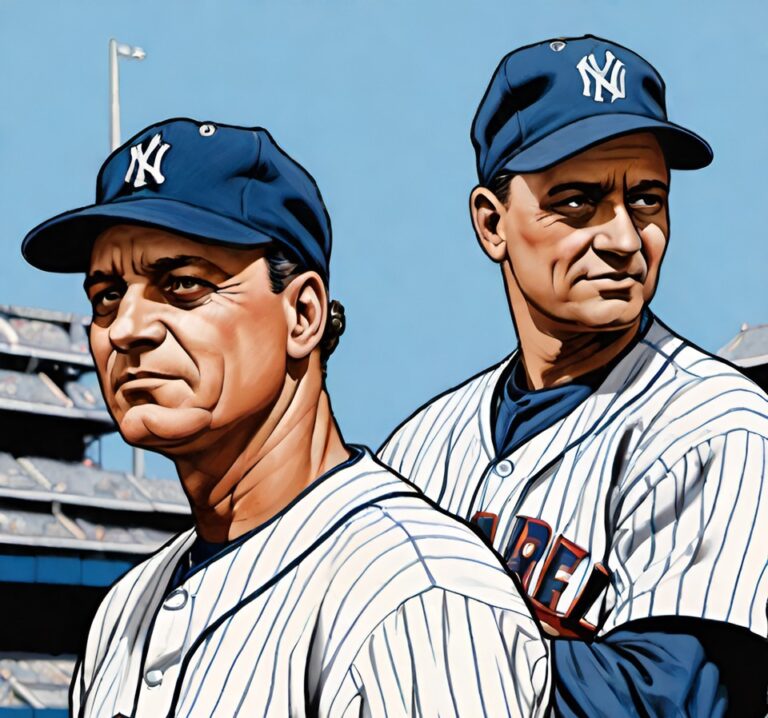In the world of professional sports, there are few records as impressive and enduring as the consecutive game streak. To be able to step out onto the field day after day, year after year, without missing a single game is a feat that only a select few athletes have been able to accomplish. Among those greats are Lou Gehrig and Everett Scott, two former New York Yankees who etched their names into the annals of baseball history with their incredible streaks.
Less than a month before Lou Gehrig began his 2130 consecutive game streak, fellow Yankee Everett Scott’s 1307 game streak ended when he was benched. Scott and Gehrig are third and second on the all-time list, with Cal Ripken Jr. holding the top spot with 2632 consecutive games played. The stories of Gehrig and Scott serve as testaments to their unwavering dedication, resilience, and love for the game. Let’s take a closer look at these extraordinary athletes and their remarkable achievements.
Lou Gehrig: The Iron Horse
Nicknamed “The Iron Horse” for his durability and strength, Lou Gehrig is widely regarded as one of the greatest baseball players of all time. Throughout his career with the New York Yankees, Gehrig’s consistency and reliability on the field were unmatched. His legendary 2130 consecutive game streak stood as a testament to his incredible work ethic and dedication to the sport.
Born on June 19, 1903, in Manhattan, New York, Gehrig showed early promise as a baseball player, and he went on to become one of the most iconic figures in the sport. His streak of 2130 games, which began on June 1, 1925, and ended on May 2, 1939, is a record that has become synonymous with his name. Gehrig’s impressive streak only came to an end when he was diagnosed with amyotrophic lateral sclerosis (ALS), a degenerative neurological disease that would later take his life.
Despite his illness, Gehrig’s impact on the sport and the world at large remains immeasurable. His legacy lives on through the Lou Gehrig Memorial Award, which is presented annually to a player who best exhibits the character and integrity of Lou Gehrig, as well as through the continued efforts to raise awareness and funds for ALS research.
Everett Scott: The Unsung Streak
While not as well-known as Lou Gehrig, Everett Scott’s 1307 consecutive game streak is a remarkable achievement in its own right. Scott, a shortstop for the New York Yankees, began his streak on June 20, 1916, and it came to an end on May 6, 1925. His consistency and durability on the field were a testament to his skill and dedication as a professional athlete.
After his time with the Yankees, Scott went on to play for the Boston Red Sox, Washington Senators, and Chicago White Sox before retiring from professional baseball in 1929. While his consecutive game streak may not have garnered the same level of attention as Gehrig’s, it remains a significant accomplishment that solidified his place in baseball history.
FAQ
1. How did Lou Gehrig and Everett Scott manage to play in so many consecutive games?
Both Gehrig and Scott were known for their exceptional physical conditioning, mental toughness, and dedication to their craft. They understood the importance of maintaining their health and avoiding injuries, and they were diligent in their approach to training and preparation.
2. Were there any close calls or instances where their streaks were in jeopardy?
Throughout their respective streaks, both Gehrig and Scott undoubtedly faced various minor injuries and setbacks that could have potentially ended their streaks. However, their resilience and determination allowed them to push through these challenges and continue playing day in and day out.
3. How do Gehrig and Scott’s consecutive game streaks compare to other athletes in different sports?
While baseball’s consecutive game streaks are certainly impressive, they are by no means the only examples of remarkable durability and longevity in sports. Athletes in other sports, such as basketball, football, and hockey, have also achieved extraordinary streaks of consecutive games played, each with its own unique set of challenges and demands.
4. What are the lasting legacies of Gehrig and Scott’s consecutive game streaks?
Gehrig and Scott’s consecutive game streaks have left an indelible mark on the sport of baseball and serve as inspirations for current and future athletes. Their dedication, resilience, and unwavering commitment to their craft continue to inspire fans and players alike, reminding us of the incredible feats that can be achieved through hard work and determination.
5. How have advancements in sports medicine and athletic training impacted the possibility of breaking these consecutive game streak records?
Advancements in sports medicine and athletic training have undoubtedly had an impact on the longevity of athletes’ careers and their ability to maintain extended periods of consecutive game appearances. With improved knowledge of injury prevention, recovery techniques, and overall physical health, athletes today are better equipped to withstand the demands of playing in numerous consecutive games.
The consecutive game streaks of Lou Gehrig and Everett Scott stand as testaments to their extraordinary skill, dedication, and love for the game of baseball. Their lasting legacies continue to inspire and awe sports fans around the world, serving as reminders of the incredible achievements that can be accomplished through unwavering determination and resilience.


